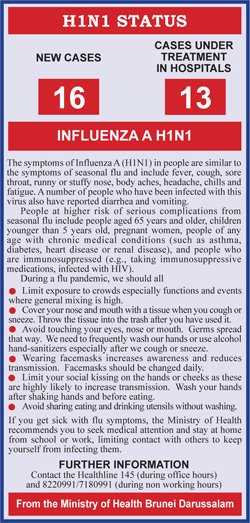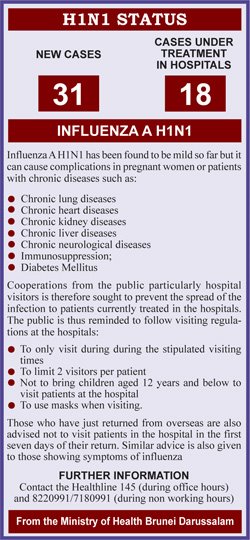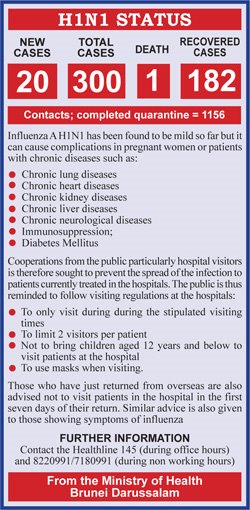Students who have returned from abroad after June 23, may apply and are advised to apply for an extended holiday to stay home as precaution against the probable spread of the fast-infecting swine flu virus to other students.
The Ministry of Health previously urged those who have just returned home from abroad to stay away from any social congregation for a week to make sure they are free from the highly contagious swine flu virus and the public were told to step up their own personal hygiene initiative while abroad.
Yesterday, with the new school term opening on Monday, to further gear up schools in the fight against the imminent phase-6 global pandemic, the Ministry of Health has distributed some 1,000 thermometers and 10,000 masks to schools.
With the equipment, schools were asked to check temperatures of students before entering school compound or before starting of class as a temporary measure effective June 29. They were told not to miss out any single student.
The alert level is 40 degree Celsius, where the affected students will be immediately relieved and masks will be immediately given.
Schools will reopen on June 29, and out of the concern on the H1N1 virus, officials from the Ministry of Education along with health officials told schools to allow students to apply for extended holiday for a week.
"Please allow your students to stay at home for a week from the date of their arrival after June 23," Acting Director of Schools, Awg Ibrahim bin Hj Abd Rahman said yesterday during the briefing and distribution of thermometers and masks to schools nationwide at Maktab Sains Paduka Seri Begawan.
During a briefing, which was attended by school principals and representatives, Dr Linda Lei from the Ministry of Health said that those infected with the H1N1 virus usually show symptoms within a week of being infected. It is a good measure to follow, where students who came from abroad must stay a week at home or so.
The briefing was held to raise teachers' understanding on the infectious disease and how it spreads. The masks and infra-red based thermometers were handed out to principals and schools representatives by Dato Paduka Hj Abd Salam bin Abd Momin, the Permanent Secretary at the Ministry of Education and Awg Hj Ismail bin Hj Abd Manap, Acting Permanent Secretary at the Ministry of Religious Affairs.
The thermometers are for use by teachers to check the temperature of students before entering the school compound or before the classes start.
If any student has any symptoms such as coughing, running nose or fever, teachers will be required to fasten the mask to the student and parents will be notified to bring their children for an immediate medical check-up. Teachers were also told to advise parents not to send their children to school if their children have the symptoms such as coughing and fever. The swine flu symptoms are similar to the symptoms of the influenza virus most are familiar with. The good news is that most people who become infected will do fine and will not have any long-term complications.
Those whose immune system is compromised, older or pregnant women may be at higher risk of complications or serious respiratory illness.
The most common swine flu symptoms are cough, nasal congestion, nausea/vomiting, diarrhoea, body aches, joint pains, fevers, sore throat, headaches, fatigue, decreased energy and rarely death in more severe cases, especially from pneumonia.
The World Health Organisation elevated the worldwide pandemic alert to phase 5, on April 29 when WHO considers a pandemic is imminent. On June 11, WHO said the pandemic has reached phase 6, indicating the flu has spread worldwide.
As of June 24, 2009, 11 cases have been detected in the Sultanate.
Acting Director of Schools, Awg Ibrahim bin Hj Abd Rahman, stressed that schools should put emphasis on cleanliness, ask students to sanitise their hands before entering class and step up personal hygiene.




No comments:
Post a Comment